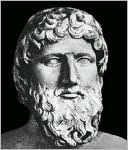Plato, in his Theaetetus, gathers up the sceptical tendencies of his age, and compares them. But he does not seek to reconstruct out of them a theory of knowledge. The time at which such a theory could be framed had not yet arrived. For there was no measure of experience with which the ideas swarming in men’s minds could be compared; the meaning of the word ‘science’ could scarcely be explained to them, except from the mathematical sciences, which alone offered the type of universality and certainty. Philosophy was becoming more and more vacant and abstract, and not only the Platonic Ideas and
...more
Welcome back. Just a moment while we sign you in to your Goodreads account.


